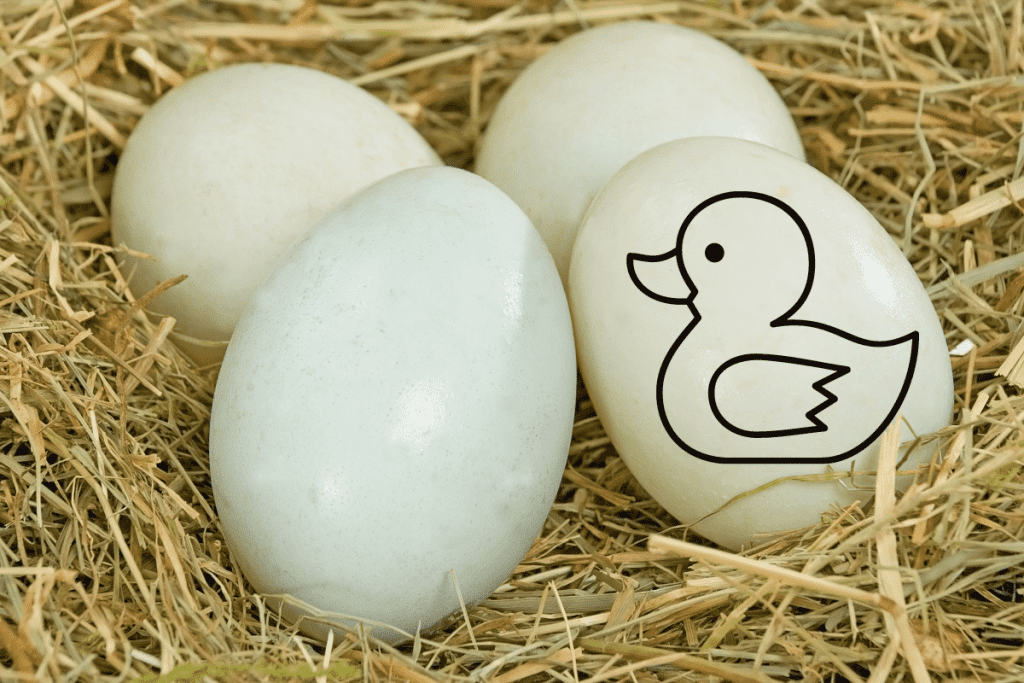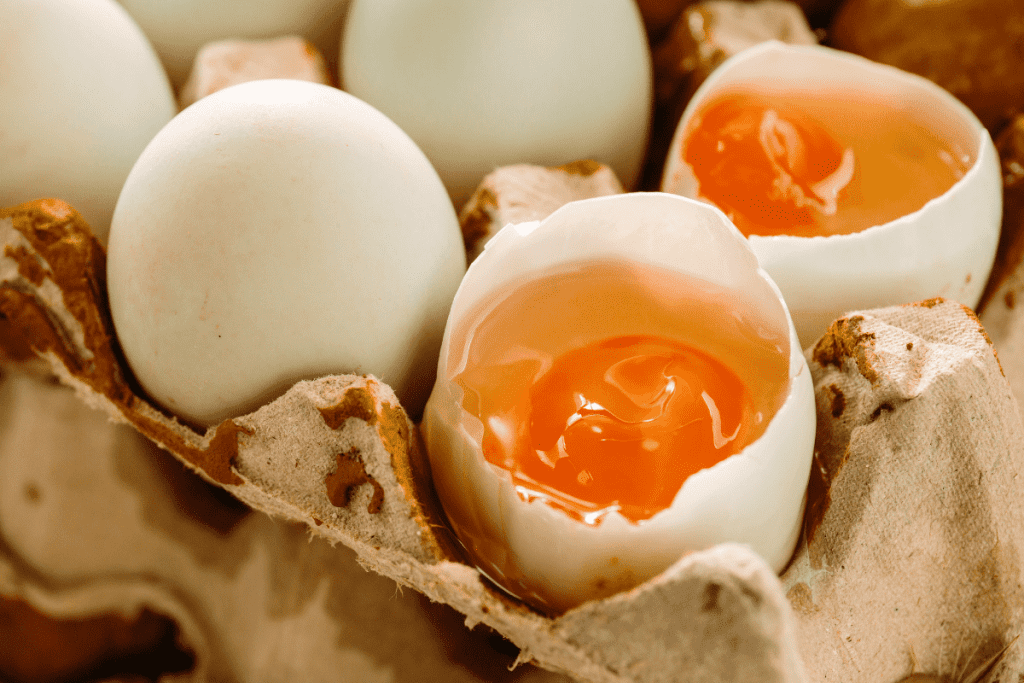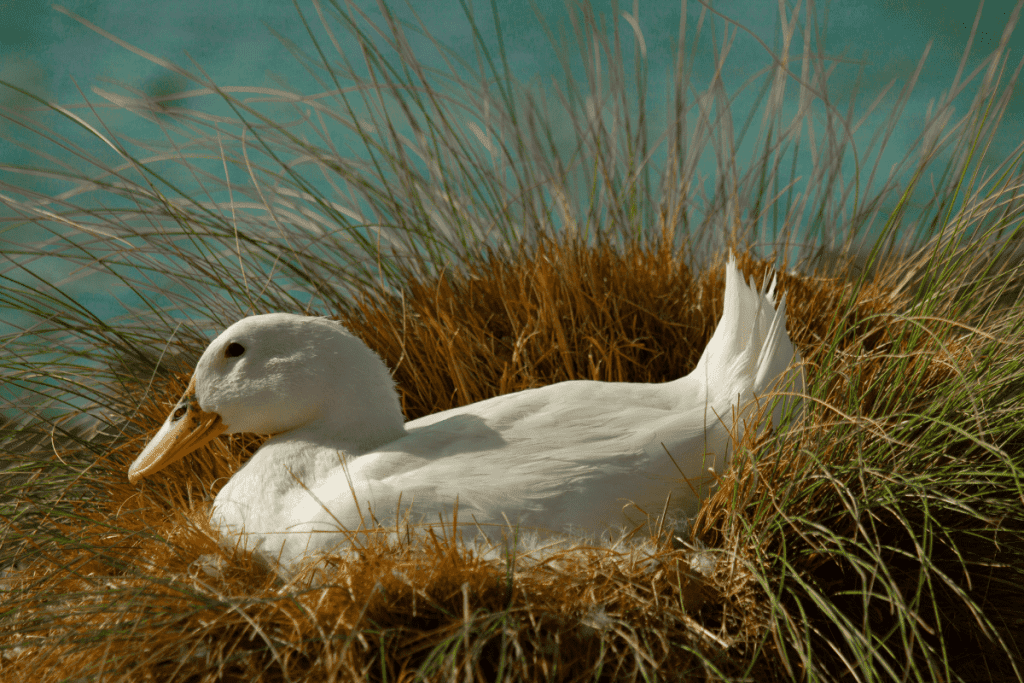Chickens have long been a common companion on the farm. However, a duck is a great choice as well.
While there are some critical differences from chicken eggs, ducks offer a high level of egg production.
For example, do they lay eggs every day as chickens do?
Ducks will typically lay eggs every day during their egg-laying season, just like a chicken. Generally speaking, most nesting waterfowl like swans, ducks, and geese lay eggs every 24-48 hours, depending on the breed and species.
If you want to learn more about ducks and duck eggs, keep reading!
We’ll cover everything you need to know, from what sets duck egg production apart from chicken egg production and a few other common questions you might have.

Table of Contents
ToggleDo Ducks Lay Eggs Every Day Like Chickens?
Ducks usually start to produce eggs when they’re about four to seven months old or at the 16-28 week mark.
However, the exact age your ducks start to produce eggs can depend on the breed of duck you have.
Some breeds, like Muscovies, tend to lay eggs later while some breeds lay sooner, like bantam ducks.
What Month Do Ducks Lay Eggs?
The egg-laying months for most ducks start in March and stretch into late July. Once this egg-laying season starts, it can last up to 45 weeks but may stop as early as 35 weeks.
Wild ducks tend to come in earlier in this estimate, laying their eggs in the early spring season.
On the other hand, your domesticated ducks may not line up with the behavior of wild ducks.
If you have ducks who reach maturity in the winter, you’ll notice a delay in egg production.
Different duck breeds may fall earlier or later in this timeline as well.
Do Ducks Lay Eggs Without A Male?
Females ducks can still lay eggs without a male duck, or drake, present. These unfertilized duck eggs aren’t going to hatch into ducklings, though, just like an unfertilized chicken egg won’t yield a chick.
Female ducks are perfectly capable of laying an egg without a drake present.
These eggs are known as unfertilized eggs and will never hatch into a duckling.
Further Reading: What Needs To Happen To Fertilize Duck Eggs
This means that in a female-only flock, each will still be an egg-laying duck.
If you want new ducklings to hatch, a drake is necessary to fertilize the eggs.
You won’t see your ducks lay fertilized eggs without participating in the breeding season.
The good news is many duck breeds, especially domesticated breeds like the buff duck, do a great job of teaching new ducklings the ropes.
Learn if ducks can breed with chickens.
Do You Have To Collect Duck Eggs Every Day?
While you don’t have to collect duck eggs every day, it’s good to do so if you want to promote egg production. By collecting them every day, the ducks will lay far more eggs in the long run.
If you don’t collect the eggs, your ducks will likely attempt to nest rather than produce further eggs.
This is particularly a problem once a duck lays enough eggs to be happy with her clutch size and starts to nest.
Duck owners have to make sure they check for new eggs daily.
Remember, don’t just look in your duck’s nesting boxing.
You might find a duck egg in other areas, like nestled in a corner, buried in some bedding, or other areas.
It’s essential to make sure you look around to catch a duck egg a duck may have hidden out of sight to keep safe.
You’ll especially want to collect eggs daily if your ducks didn’t participate in the breeding season and laid an unfertilized duck egg.
After all, those eggs aren’t going to hatch into a duckling for them to mother.
Once you’ve had your ducks for a while, this chore will get easier.
Over time, you’ll learn where your duck likes to lay her eggs and where to look for new deposits.
Check out the cost of owning a duck.
How Long Can Ducks Go Without Laying An Egg?

The time a duck can go without laying an egg can vary depending on why your duck has stopped laying eggs. Some causes are temporary, while others mark the end of your duck’s natural egg production cycle: light, stress, time of year, breed, and more.
For one, a duck naturally produces fewer eggs in the fall and winter than in the spring and summer.
Artificial light is sometimes used to extend this laying season because it’s largely linked to the amount of light your duck gets.
When the days are longer in summer, you’ll see a higher egg production than as the nights stretch longer into winter.
Artificial conditions like manmade artificial lighting can manipulate this concept.
Stress can play a big role too.
A happy duck will give you more eggs, so keep your duck as happy as possible to keep production high!
Due to this, you might notice a drop in egg production from sudden changes like a shift in their diet or moving your duck into a new home.
Ducks can get stressed out by other ducks too.
Too many ducks housed together can stress ducks out and lead to a decline in egg production.
This problem is more common on large, commercial farms.
It’s not as expected of a problem for small farms.
If you notice your ducks getting stressed out from close quarters, give your ducks a few extra walls to give them more physical separation from one another.
Even your ducks want a little room when they lay an egg, and an overcrowded pen is a surefire way to stress them out!
As your duck ages, you’ll notice a decline in her egg production.
This is natural and just part of the life cycle of a duck.
When Do Ducks Stop Laying Eggs?
Naturally, over time, your duck will stop laying eggs altogether. Most owners can expect domestic ducks to produce eggs until they’re about seven to nine years old. Egg production tends to decline when your duck reaches three to five years old.
Of course, this is a standard number.
You might notice your duck starts or stops producing eggs a little earlier or later than another adult duck you’ve worked with.
Unless the stop in production is very sudden or significantly off-schedule, some deviation is standard.
Usually, you’ll see your duck stop laying eggs well before they would naturally die of old age.
The average duck lives about eight to 12 years, but this can vary depending on the breed you’re working with.
Do Male Ducks Lay Eggs?
Male ducks do not lay eggs, but they are necessary to fertilize an egg if it’s going to hatch into a duckling. Only female ducks will lay eggs the same way only a female horse will birth a foal.
However, the eggs your ducks lay will be unfertilized without a drake present.
This means those eggs will work for food, but they’re not going to hatch into a new duck after they’re incubated.
Drakes are also typically less involved with the ducklings than the mother duck is.
Do Ducks Lay Eggs In The Water?
Generally speaking, a duck isn’t likely to lay its eggs in the water. It’s much more common for wild ducks to build a nest near the water for their eggs.
In some cases, the bird might lay her eggs underwater if she feels like they’re particularly unsafe.
This is uncommon and usually only happens under challenging situations, such as a duck whose nest was recently compromised.
When it comes to your domesticated farm duck, you probably won’t see them laying eggs in the water.
Rather, keep an eye out for the places discussed earlier.
This includes locales such as nesting areas in the duck’s bedding, hidden in a corner, and other similarly protected areas.
Once again, as you continue to collect the eggs, you’ll notice where your ducks like to lay their eggs.
If a duck does lay her eggs in the water, they won’t hatch there.
The eggs will need to move to land before hatching if they’re fertilized.
Further Reading: Can you move a duck’s nest with eggs?
Can Ducks Lay Two Eggs A Day?

You’ll likely see your ducks lay an egg per day most of the time. Sometimes, this production may ramp up, and you will see your duck produce two eggs in a single day.
Double egg production in a single day isn’t common, but it isn’t necessarily anything to worry about.
You might notice it as the seasons change.
Alternatively, it can fluctuate as the animal’s hormones do too.
This is common in young ducks who are just coming to maturity.
If you notice a duck laying a second egg, it’s normal for this egg to look slightly different from the first one.
The hard shell of an egg is made up of various materials the mother duck produces, such as calcium.
Yet, these animals can’t produce these minerals indefinitely.
The second egg one of these waterfowl lays is usually a bit softer since these minerals were more recently depleted.
This egg is still safe to consume.
Over time, you’ll likely notice this balances out, or you might only have a single instance of a double egg.
What Do You Do With Duck Eggs After They’re Laid?
Duck eggs offer many of the same uses as chicken eggs. The main difference is that duck eggs tend to be much larger than chicken eggs – about 30% larger on average. Remember to adjust any recipes to account for the size and the added richness of a duck egg.
After you collect your duck eggs, wipe them down but don’t wash them off.
Just put them in a container and pop them in the fridge, so they’re ready to use when you need them.
When you’re cooking with duck eggs, you’ll notice a few key differences from chicken eggs aside from size.
For one, duck eggs tend to contain higher cholesterol levels and a higher fat content with plenty of Omega-3 fatty acids.
Another difference to note is yolk size. Duck eggs tend to have larger yolks – both directly and proportionally.
This makes them great for protein.
All of these features tend to give duck eggs a richer flavor than chicken eggs and offer more volume per egg.
What Is The Shelf Life Of A Duck Egg?
Once you collect your duck eggs, they’ll last for 3 weeks when stored at room temperature and up to 4 months in the fridge. Just like any other type of egg, it’s essential to properly store them and know when they simply go bad.
The big difference here is whether you refrigerate your duck eggs or not.
If you want them to last as long as possible, you’ll want to keep them in the fridge.
If you leave your eggs out on the counter once you collect them, they’ll last for about three weeks.
By placing these eggs in the fridge, you’ll extend their lifespan significantly.
Farm-fresh duck eggs kept in the fridge last up to four months before they go bad.
Do Ducks Lay Eggs In The Water?
A duck isn’t likely to lay its eggs in the water. It’s much more common for wild ducks to build a nest near the water for their eggs as this provides access to more food and safety. In some cases, the bird might lay her eggs underwater if she feels like they’re particularly unsafe.
This is uncommon and usually only happens under challenging situations, such as a duck whose recently compromised nest.
When it comes to your domesticated farm duck, you probably won’t see them laying eggs in the water.
Rather, keep an eye out for the places discussed earlier.
This includes locales such as nesting areas in the duck’s bedding, hidden in a corner, and other similarly protected areas.
How useful was this post?
Click on a star to rate it!
We are sorry that this post was not useful for you!
Let us improve this post!
Tell us how we can improve this post?
